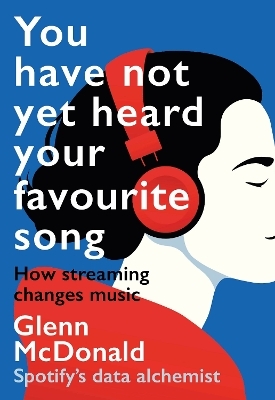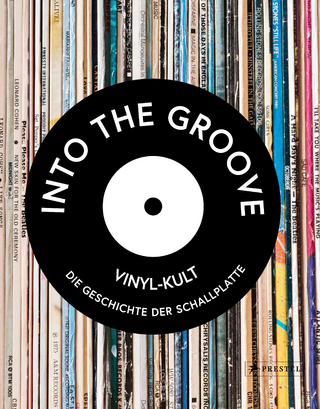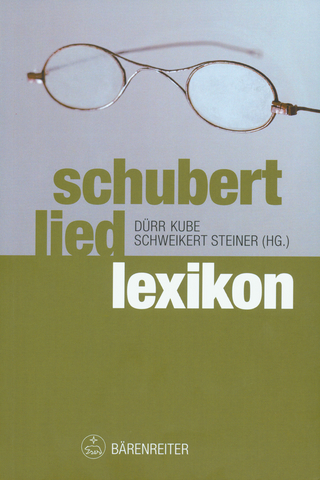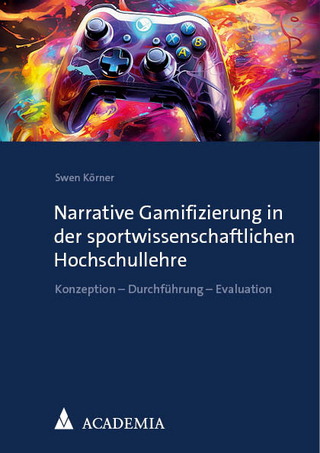
You Have Not Yet Heard Your Favourite Song
Canbury Press (Verlag)
978-1-914487-15-6 (ISBN)
One of the best music books of the year – Neil McCormick, Daily Telegraph
For the first time in history, almost every song ever recorded is available instantly. Everywhere.
This book charts what music’s dazzling digital revolution really means for fans and artists. As a former data guru at the world’s biggest streaming service, Spotify, Glenn McDonald reveals:
What the tech giants know about you
How they serve up your next song
Whether fans can cheat the algorithm
Whether jazz is dead and ASMR is the new punk
Your chances of becoming a rock star
Having analysed the streams of 500 million people, McDonald explores what the data tells us about music and about ourselves, from the secrets of russelåter in Norway to Christmas in the Philippines. Statistically, you have not yet heard your lifetime’s favourite song. This book will take you on a voyage of discovery through music’s fast-flowing new waters.
10 bonus playlists of wonder included!
About the Author
Glenn McDonald is expertly placed to provide a comprehensive picture of the global music industry in the 2020s.
Growing up in 198Os and 1990s America, he was an obsessive collector of physical music – CDs and vinyl albums. But he soon realised the revolutionary power of digital media to make songs more widely accessible.
He started doing data work at the US music-intelligence startup The Echo Nest, which was soon acquired by Spotify. He became Spotify's 'Data Alchemist.' His website Every Noise at Once (everynoise.com) is an unprecedented computational map of the world’s music genres.
Reviews
'If you want to know anything about how music surfaces today, how to find it, or how to create it, you will find what you need right here. And you will be highly entertained and amused in the process.' – Joseph Menn, Washington Post staff writer and author of All the Rave: The Rise and Fall of Shawn Fanning's Napster.
'We used to sell CDs by the weight of pallets, thanks to streaming we know how our content is consumed. In this immersive book, Glenn has demonstrated what we can do with this knowledge, so other industries facing their Napster Moment can learn from his unrivalled first mover advantage' – Will Page, author of Pivot and former Chief Economist of Spotify
'I'd say that reading this book is the next best thing to having an in-depth, impassioned, hours-long fika with Glenn McDonald about music and culture and all of the most burning topics of our time... but, I'd be lying. It's even better. This book is a true behind-the-scenes examination of our culture and our industry from the perspective of someone who was in the thick of it from the beginning. It's a history of the streaming era, written by someone who made history in the streaming era." Meg Tarquinio, PhD, Spotify/Twitch/Nettwerk Music Group
'Throughout McDonald's book, personal anecdotes and his own love of music spill out in witty, conversational prose. Even chapters that delve into streaming's complex finances – unsurprisingly, your £15 monthly fee does not go directly to your favourite artist, but is split between that month's "most streamed," meaning that megastars such as Swift and Ed Sheeran stay at the top of the pyramid – are told in layman's terms.' Poppie Platt, The Daily Telegraph
Extract
CHAPTER 9. MERCENARIES AND FAN ARMIES
Where there's an 'economic system,' there's probably fraud.
This is not a proud truth to admit about humanity, but it seems to me to have been consistently historically true. Money is supposed to be a bookkeeping mechanism, but it becomes a goal.
Fraud and cheating existed in the music business, like any business, long before streaming happened. Back when charts were based on people reporting sales numbers on phone calls, those people could be bribed to say different numbers. Radio DJs could be paid to pretend they were playing a song more because they just liked it. Accounting could be manipulated.
Streaming doesn’t necessarily make cheating easier, overall, but it definitely makes it more accessible to introverts. Instead of making phone calls, you can write computer programs that pretend to be streaming-music listeners. Piracy maintains a certain dastardly allure.
Streaming music fraud is not, to be brutally honest, the most glamorous or profitable form of dastrardry. Streaming rewards accumulate in tiny micro-transactions, and the software necessary to laboriously accumulate micro-royalties illegitimately isn’t any easier to write than legal software for which you can get paid normal salaries. It only really scales if you become a service-provider selling fraud as a service, and then you’re a business with business problems, instead of a pirate with a rakish eye-patch and the sea air in your hair. If you want to cheat your way to riches, you’re better off trying to do it in junk stocks or cryptocurrencies, where there’s way too much money sloshing around and the distinction between “legitimate” behavior and cheating is fuzzy.
So you might have thought that fraud wouldn’t be a big issue in streaming...
Buy the book and carry on reading
Glenn McDonald is a software engineer, algorithm designer, music evangelist and former long-time Data Alchemist at Spotify, the world’s biggest music streaming service. From the 1990s, he was one of the earliest and most prolific explorers of how to use data to understand and amplify our collective and individual experiences of music. His work at the US music-intelligence startup The Echo Nest helped bring about its 2014 acquisition by Spotify, which put him at the algorithmic heart of streaming music and the listening habits of 500 million people. His website Every Noise at Once (everynoise.com) has an unprecedented computational map of the world’s music genres, and a large and growing variety of other tools for exploring music and joy. His personal blog (furia.com) offers occasional commentary on this, and various other digressions. He lives in Cambridge, Massachusetts.
Introduction 1
PART 1: THE DISCONNECTED AGE
1. Precious Jukeboxes. Music Consumption as a Shopping Experience 9
2. The Panic and the Crash. The Internet, Napster, iTunes, iPods and the Downloading Interregnum 13
PART 2: HOW STREAMING WORKS
3. Better Than Free. How Streaming Got People to Spend Money on Music Again 19
4. All the World’s Music (sort of). How Music Gets Online 25
5. A Zillion Ambiguous Clicks. What Streaming Services Know About You 29
6. The Robots Have No Plan. What Algorithms Do and Don’t Do 35
PART 3: NEW FEARS
7. The New Gatekeepers. Major Labels, Playlists, More Playlists, Algorithmic Playlists and the Playlists Your Friends Make 43
8. “Ed Sheeran Is Taking My Money”. How Streaming Pays Artists 51
9. Mercenaries and Fan Armies. Cheating and Devotion vs Math, and the Casual War Against Hilariously Implausible Fraud 67
10. Our Inertia Exposed. “Organic” Listening and Social Equity 79
11. Chill Is the New Muzak. The Borders Between Background and Foreground Sounds 87
12. Constant Engagement. The Death and Survival of The Album 95
13. Undemanded Music in an On-Demand World. The Uncertain Fate of Jazz, Classical, Experimental and Other Quiet, Noble Arts 107
14. Renting the Things You Love Most. Fluctuating Availability and the Impermanent Record of the Streaming Catalog 117
15. The Best Bad Answers. How Algorithms Fail 127
PART 4: NEW JOYS
16. All the World’s Listening (sort of). Streaming as a Global Collective-Wisdom Collector 145
17. No Walls Without Doors. What Music Tells Us About Each Other and the World 159
18. Cities In and Out of Hyperspace. Genres as Distributed Communities of Interest 175
19. Borrowed Nostalgia. Other People’s No-Longer-Secret Music 191
20. Text as Texture. Hip Hop Literally Everywhere, and How to Listen to Rap You Can’t Understand 199
21. New Punks. Weird and/or Scary Music that Sounds Normal to the Kids, or Vice Versa 209
22. Every Noise at Once. Music as an Infinite Resource 223
PART 5: NEW QUESTIONS
23. What Is Art Worth? How Should the New Economy Work? 243
24. What Is Your Love Worth? How Do You Listen Morally? 251
25. Algorithmic Responsibility. How Do You Encode Conscience? 259
26. What Now? We Have All the World’s Music. What Do We Do Next? 269
AFTERWORDS
Acknowledgements 275
10 Playlists of Somebody’s Favourite Songs 277
| Erscheinungsdatum | 25.04.2024 |
|---|---|
| Sprache | englisch |
| Maße | 153 x 234 mm |
| Gewicht | 450 g |
| Themenwelt | Kunst / Musik / Theater ► Musik ► Allgemeines / Lexika |
| Mathematik / Informatik ► Informatik | |
| Sozialwissenschaften ► Kommunikation / Medien ► Medienwissenschaft | |
| Technik | |
| ISBN-10 | 1-914487-15-X / 191448715X |
| ISBN-13 | 978-1-914487-15-6 / 9781914487156 |
| Zustand | Neuware |
| Informationen gemäß Produktsicherheitsverordnung (GPSR) | |
| Haben Sie eine Frage zum Produkt? |
aus dem Bereich


